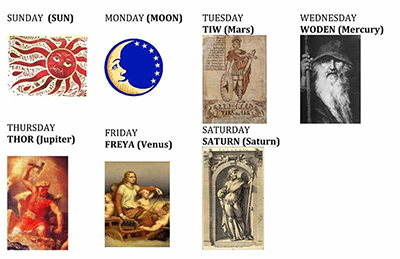
How the Days of the Week Got Their Names
The days
of the week were named after Norse gods and giant objects in
the sky. These
names come to us originally from the Greeks and Romans, who
named the days of the week after their gods. The
Anglo-Saxons, who invaded Britain hundreds of years ago,
adopted this idea but substituted their own gods. The
English language has inherited and changed those names a
bit, but the ones we use today resemble those names.
The name Sunday comes from the idea of the day's being associated with the Sun. The Latin was dies solis, or "day of the sun," which became "Sun's day," which was shortened to one word, Sunday. In the same vein came Monday, shortened from "moon's day," which was the Anglo-Saxon monandæg.
The Norse affiliation begins with Tuesday, which came from the Norse god Tiw, sometimes called Tyr. Similarly, Wednesday comes from identification with the Norse god Odin. One of his several names was Wodin (or Wodan or Woden), and so "Woden's day" became Wednesday. The Norse god Thor is the focus of Thursday, a derivation of "Thor's day." Friday comes from the Norse goddess Frigg, so "Frigg's day" got shortened to Friday. Frigg was also referred to as Frigga or Freya.

The Roman connection returned in the last day of the week, Saturday, which began as dies Saturni, or "Saturn's day." The Romans, of course, had names for every day of the week.
- What in English is Monday was in Latin dies Lunae, or "day of the Moon." This idea survives in the modern French as lundi, in the modern Italian as lunedi, and in the modern Spanish as lunes. (Note: These modern languages do not capitalize the days of the week.)
- The English Tuesday was in Latin dies Martis, after Mars, the god of war. This idea survives in the modern French (mardi), Italian (martedi), and Spanish (martes).
- What in English is Wednesday was in Latin dies Mercurii, after the god Mercury. Today, French speakers say mercredi, Italian speakers say mercoledi, and Spanish speakers say miércoles.
- dies Jovis was named for the Roman god Jupiter, also called Jove. The modern French word for Thursday is jeudi, the modern Italian word for Thursday is giovedi, and the modern Spanish word for Thursday is jueves.
- The Roman god associated with the English-language Friday was Venus, so in Latin the day was dies veneris. Today's French, Italian, and Spanish speakers say vendredi, venerdi, and viernes, respectively.
- Following the Roman connection, the modern equivalents of Saturday in French, Italian, and Spanish are sarnedi, sabato, and sêbado, respectively.<.li>
- Somewhat differently, the English-language Sunday was in later Latin Domenica and survives in modern Latin languages as dimanche (French), domenica (Italian), and domingo (Spanish).
|
|